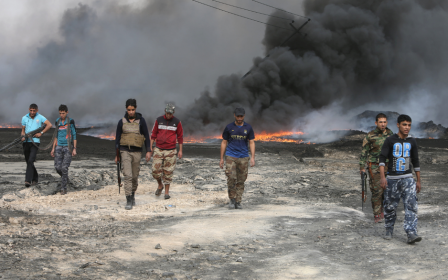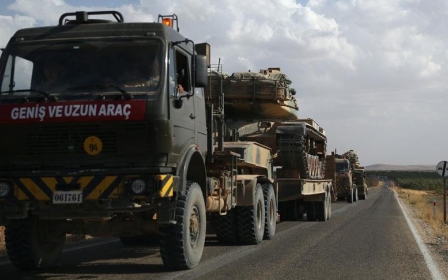'Do not retreat in shame,' Baghdadi tells followers amid Mosul assault
Islamic State leader Abu Bakr al-Baghdadi has urged fighters not to retreat, in his first message since US-backed Iraqi forces started an offensive to take back Mosul, the last major city in Iraq still under his group’s control.
"Do not retreat," said a voice presented as belonging to al-Baghdadi in an audio message released early on Thursday by the IS-affiliated al-Furqan media. "Holding your ground with honour is a thousand times easier than retreating in shame," he said in the message, his first in more than a year. It was not clear if the IS leader was in Mosul or elsewhere.
He also called on Islamic State fighters to invade Turkey and launch “attack after attack” on Saudi Arabia, insisting that the group has been unaffected by the deaths of senior leaders in recent months.
"This raging battle and total war, and the great jihad that the state of Islam is fighting today only increases our firm belief, God willing, and our conviction that all this is a prelude to victory," he said in an audio recording released online by supporters on Thursday.
The authenticity of the 31-minute-long recording could not be verified.
The previous message purportedly coming from Baghdadi was from December 2015, an audio recording that reassured followers and supporters that airstrikes by Russia and the US -led coalition had failed to weaken the group in Syria.
Baghdadi, an Iraqi whose real name is Ibrahim al-Samarrai, called on the population of Mosul's Nineveh province “not to weaken in the jihad'' against the "enemies of God."
He also called on the group's suicide fighters to "turn the nights of the unbelievers into days, to wreak havoc in their land and make their blood flow as rivers."
The battle that started on 17 October with air and ground support from a US-led coalition is shaping up as the largest in Iraq since the US-led invasion of 2003.
Mosul still has a population of 1.5 million people, much more than any of the other cities captured by Islamic State two years ago in Iraq and neighbouring Syria.
However, many thousands of people have fled the city – footage filmed on Wednesday showed people digging holes in the desert for lack of shelter.
"We are digging our own graves, but we are still alive," one man told the Kurdish news channel.
Refugees who escaped from Mosul have described how IS fighters would push people off the tops of buildings to their deaths on suspicion of violating the group’s strict rules, or of passing information to enemy forces.
‘Unleash fire of anger on Turkey’
Baghdadi also told Islamic State's fighters to “unleash the fire of their anger'' on Turkish troops fighting them in Syria, and to take the battle into Turkey.
“Turkey today entered your range of action and the aim of your jihad ... invade it and turn its safety into fear.''
Islamic State has been retreating since last year in both Iraq and Syria, in the face of a myriad of different forces.
In Iraq, it is facing an advance by US-backed Iraqi government and Kurdish forces, as well as Iranian-backed Iraqi Shia militias.
In Syria, it is fighting Turkish-backed Syrian rebels opposed to Syrian President Bashar al-Assad, US-backed Kurdish fighters as well as Russian- and Iranian-backed Syrian army units loyal to Assad and foreign Shia militias.
Baghdadi told his followers to launch “attack after attack'' in Saudi Arabia, targeting security forces, government officials, members of the ruling Al Saud family and media outlets, for “siding with the infidel nations in the war on Islam and the Sunna (Sunni Muslims) in Iraq and Syria.''
Islamic State's leader also said “the caliphate was not affected'' by the death of some of its senior commanders, mentioning Abu Muhammad al-Adnani and Abu Muhammad al-Furqan, both killed earlier this year in US air strikes.
Middle East Eye propose une couverture et une analyse indépendantes et incomparables du Moyen-Orient, de l’Afrique du Nord et d’autres régions du monde. Pour en savoir plus sur la reprise de ce contenu et les frais qui s’appliquent, veuillez remplir ce formulaire [en anglais]. Pour en savoir plus sur MEE, cliquez ici [en anglais].




